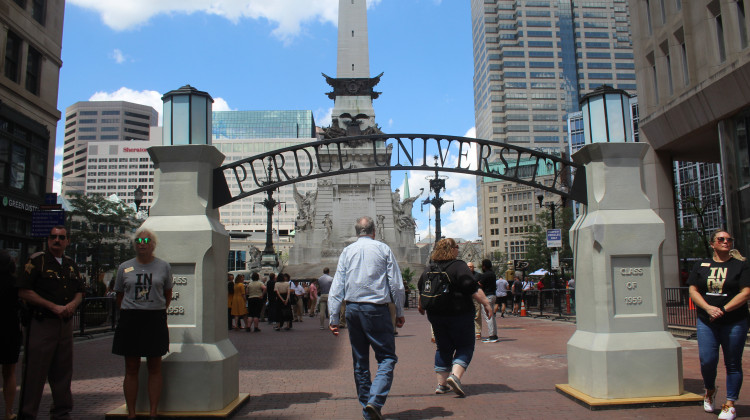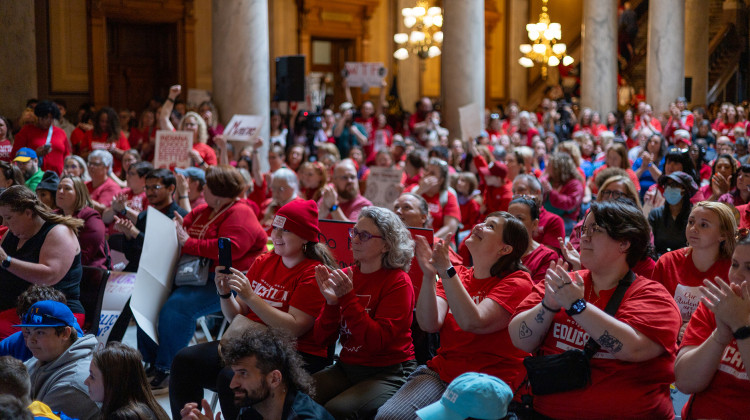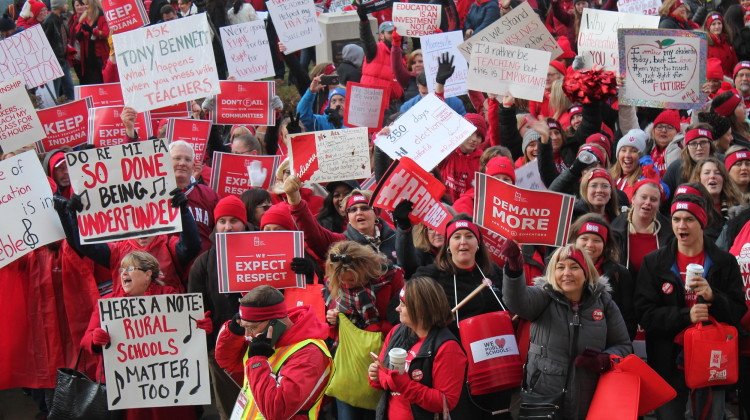
An American flag waves in front of Clay High School in South Bend.
Jennifer Weingart/WVPE Public RadioWednesday marks 18 years since the terrorist attacks of Sept. 11, 2001. That means most high school students weren’t alive when the attacks happened.
For those who lived through 9/11, it’s a day that will never be forgotten.
Darcy King-O’Blenis teaches U.S. history and government at Clay High School in South Bend, Indiana.
“It is a hinge of history and you do remember where you were, what you were doing, how you felt, and how you were forced to process," King-O'Blenis says. "And so it is innocence lost and it was stunning and it was an emotional impact.”
And early on after 9/11, students had those feelings and memories as well.
For today’s high schoolers, they don’t remember 9/11, but they live every day with the impact of it. They’ve never been through an airport without people taking off their shoes. They don’t remember a time when America wasn’t at war. They don’t have the same expectation of privacy that older generations do.
And some of them, don’t know what happened on Sept. 11, 2001 at all.
“Since I have the freshman, my job is to introduce the topic," Jene Hartman, a social studies teacher at Clay says. "These kids were not born so unless they’ve been introduced to it early on, they don’t know the details of 9/11.”
Hartman starts out with what the United States was like before that bright Tuesday morning.
“We had fallen into this complacent comfort zone of ‘no one attacks the United States’ and now when something like that happens how we have to shift our societal norms and go forward with those kinds of changes.”
Then the students learn what happened that day, and what has happened since; the societal changes that impact everyday life in America, 18 years later.
King-O’Blenis builds on that. She said she tries to get the kids to connect with the event. She has them interview an adult that remembers 9/11. Then the students have to write about an experience in their life that impacted them.
“The confusion, the astonishment, the fear, the anger and try to capture that in their own personal life," King-O'Blenis explains. "When in their life did they experience something that changed the trajectory of their life?”
Wendy Harman also teaches social studies at Clay High School. She says in her classes she tries to use 9/11 as a teaching moment for what it means to be American.
“Trying to connect them with those feelings of, what do we want as a nation? What do we want as a country? Who are we as Americans?" Harman says. "So I kind of take some of the small snippets of things and then kind of relate it to current events and how it might relate to them now.”
The teachers’ goals are to use the history to help the kids understand the impact the past has on the present and on the future.
“My history kids can hopefully connect emotionally, my government kids, an emotional connection but maybe a real life connection of issues that are facing us today,” King-O'Blenis says.
One day it will fall on this generation of students to pass on the history and lessons of 9/11 to those even further removed from the events of that bright autumn day 18 years ago.
Contact Jennifer at jweingart@wvpe.org or follow her on Twitter at @jen_weingart
 DONATE
DONATE






 Support WFYI. We can't do it without you.
Support WFYI. We can't do it without you.